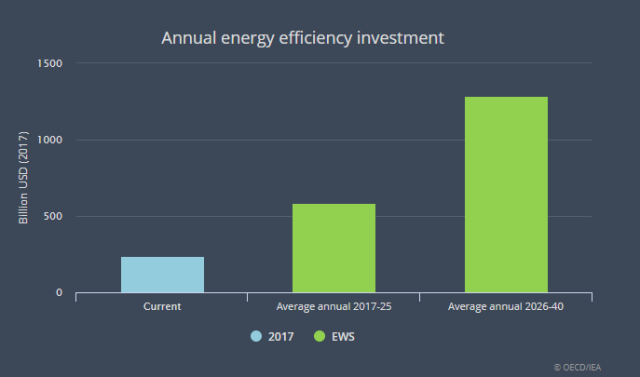International Energy Agency (IEA) has released Energy Efficiency 2018 report — a global strategy focused on what governments can do to enhance energy efficiency.
IEA said global energy demand rose by nearly 2 percent in 2017.
Last year the world could have saved more than
# 2.2 million barrels of oil per day if all countries had adopted the best passenger fuel economy standards
# 16 percent of industry electricity use if all countries had adopted the strongest electric motor standards
# $20 billion if everyone had purchased the top 10 percent most efficient refrigerators
IEA said emerging economies could become 50 percent less energy intensive under the Efficient World Scenario (EWS), with China and India accounting for one third of total energy demand in 2040. China and India would account for over one third of the total energy demand savings, which would translate into savings of nearly $500 billion in fossil fuel imports.
“Our study shows that the right efficiency policies could alone enable the world to achieve more than 40 percent of the emissions cuts needed to reach its climate goals without requiring new technology,” Fatih Birol, executive director of IEA, said.
 The report said efficiency gains since 2000 prevented 12 percent more energy use than would have otherwise been the case in 2017. Since 2000, these improvements in the world’s major economies have offset more than a third of the rise in energy-intensive activities.
The report said efficiency gains since 2000 prevented 12 percent more energy use than would have otherwise been the case in 2017. Since 2000, these improvements in the world’s major economies have offset more than a third of the rise in energy-intensive activities.
The EWS would result in a peak in energy-related greenhouse gas emissions before 2020, followed by 12 percent drop in 2040 compared with today.
The EWS would cut key air pollutants such as sulphur dioxide, nitrogen oxides and particulate matter by one third compared to today.
More efficient cooking could help reduce premature deaths from household air pollution by almost 1 million per year in 2040 in comparison with the IEA New Policies Scenario (NPS), IEA said.
IEA said average annual energy efficiency investment must double to 2025 and then double again to 2040.
All investment opportunities in the EWS are highly cost-effective and would bring significant economic benefits. IEA said policy will need to facilitate finance and business model innovation to realise this investment opportunity.
Baburajan K

